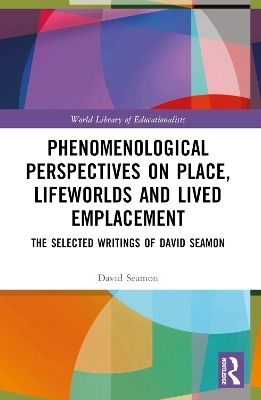
Phenomenological Perspectives on Place, Lifeworlds, and Lived Emplacement
Routledge (Verlag)
978-1-032-35732-4 (ISBN)
Phenomenological Perspectives on Place, Lifeworlds and Lived Emplacement is a compilation of seventeen previously published articles and chapters by David Seamon, one of the foremost researchers in environmental, architectural, and place phenomenology. These entries discuss such topics as body-subject, the lived body, place ballets, environmental serendipity, homeworlds, and the pedagogy of place and placemaking.
The volume's chapters are broken into three parts. Part I includes four entries that consider what phenomenology offers studies of place and placemaking. These chapters illustrate the theoretical and practical value of phenomenological concepts like lifeworld, natural attitude, and bodily actions in place. Part II incorporates five chapters that aim to understand place and lived emplacement phenomenologically. Topics covered include environmental situatedness, architectural phenomenology, environmental serendipity, and the value of phenomenology for a pedagogy of place and placemaking. Part III presents a number of explications of real-world places and place experience, drawing on examples from photography (André Kertész’s Meudon), television (Alan Ball’s Six Feet Under), film (John Sayles’ Limbo and Sunshine State), and imaginative literature (Doris Lessing’s The Four-Gated City and Louis Bromfield’s The World We Live in).
Seamon is a major figure in environment-behavior research, particularly as that work has applied value for design professionals. This volume will be of interest to geographers, environmental psychologists, architects, planners, policymakers, and other researchers and practitioners concerned with place, place experience, place meaning, and place making.
David Seamon is Professor of Environment-Behavior and Place Studies in the Department of Architecture at Kansas State University in Manhattan, Kansas, USA. He is Editor of Environmental and Architectural Phenomenology. His most recent book is Life Takes Place: Phenomenology, Lifeworlds, and Place Making (Routledge, 2018).
1. An Introduction: Going Places Part I: The Value of Phenomenology for Studying Place 2. Lived Bodies, Place, and Phenomenology 3. The Wellbeing of People and Place 4. Body-Subject, Time-space Routines and Place Ballets 5. Whither Phenomenological Research?: Possibilities for Environmental and Place Studies; Part II: Understanding Place Phenomenologically 6. Merleau-Ponty, Lived Body and Place: Toward a Phenomenology of Human Situatedness 7. Serendipitous Events in Place: The Weave of Bodies and Context via Environmental Unexpectedness and Chance 8. Architecture, Place, and Phenomenology: Buildings as Lifeworlds, Atmospheres, and Environmental Wholes 9. The Value of Phenomenology for a Pedagogy of Place and Placemaking 10. A Phenomenological Reading of Jane Jacobs’ Death and Life of Great American Cities; Part III: Places, Lived Emplacement, and Place Presence 11. Place, Placelessness, Insideness, and Outsideness in American Filmmaker John Sayles’ Sunshine State 12. Place, Belonging, and Environmental Humility: The Experience of "Teched" as Portrayed by American Writer Louis Bromfield 13. Finding One’s Place: Environmental and Human Risk in Filmmaker John Sayles’ Limbo 14. Phenomenology and Uncanny Homecoming: Homeworld, Alienworld, and Being-at-Home in Alan Ball’s HBO Television Series, Six Feet Under 15. A Phenomenology of Inhabitation: The Lived Reciprocity between Houses and Inhabitants as Portrayed by American Writer Louis Bromfield 16. Using Place to Understand Lifeworld: The Example of British Novelist Penelope Lively’s Spiderweb 17. Moments of Realization: Extending Homeworld in British-African Novelist Doris Lessing’s Four-Gated City 18. Looking at a Photograph—André Kertész’s 1928 Meudon: Interpreting Aesthetic Experience Phenomenologically
| Erscheinungsdatum | 14.09.2024 |
|---|---|
| Reihe/Serie | World Library of Educationalists |
| Zusatzinfo | 2 Tables, black and white; 5 Line drawings, black and white; 1 Halftones, black and white; 6 Illustrations, black and white |
| Verlagsort | London |
| Sprache | englisch |
| Maße | 156 x 234 mm |
| Gewicht | 544 g |
| Themenwelt | Geisteswissenschaften ► Philosophie ► Philosophie der Neuzeit |
| Naturwissenschaften ► Biologie ► Ökologie / Naturschutz | |
| Technik ► Architektur | |
| ISBN-10 | 1-032-35732-0 / 1032357320 |
| ISBN-13 | 978-1-032-35732-4 / 9781032357324 |
| Zustand | Neuware |
| Informationen gemäß Produktsicherheitsverordnung (GPSR) | |
| Haben Sie eine Frage zum Produkt? |
aus dem Bereich


